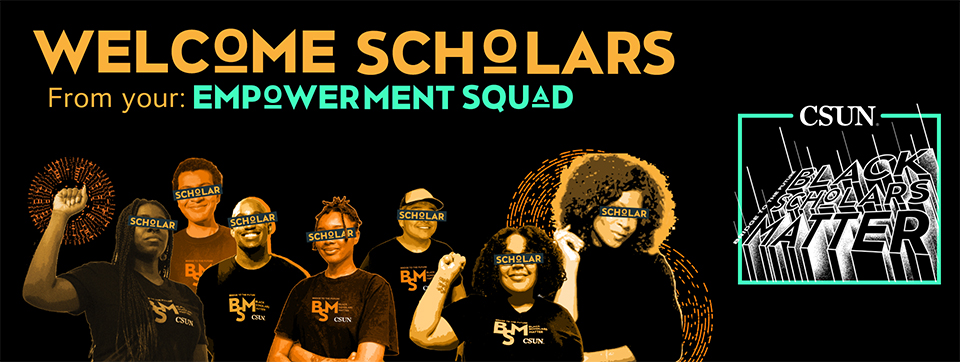CSUN Launches New Program to Support Black Students

CSUN has launched the Bridge to the Future (B2F): Black Scholars Matter (BSM) program to bolster college retention and graduation rates among Black students.
Eleven teens who are part of an innovative program to help bolster college retention and graduation rates among Black students will start their journey at California State University, Northridge this month. The teens are part of the first cohort of the Bridge to the Future (B2F): Black Scholars Matter (BSM) program.
The program is an expansion of the university’s Bridge to the Future program, directed by sociology professor David Boyns, which removes many barriers to academic success by providing a tuition-free CSUN education to students from Canoga Park High School in Canoga Park, and additional support once they are on campus.
“Many colleges and universities across the country face challenges with increasing the number of students of African descent on their campuses. CSUN is no different,” said Africana studies professor Theresa White, director of Black Scholars Matter. “We’re always looking for ways to increase that pipeline. Our Bridge to the Future program has been quite effective in ensuring the success of historically underserved students from Canoga Park High School. That program’s second class of scholars just graduated in spring 2022.
“We decided to build on the success of Bridge to the Future and create the Black Scholars Matter component, tailoring it to specifically meet the needs of students of African descent,” White said. “Black Scholars Matter is a holistic, wrap-around program with an eco-system of support that includes tuition (above and beyond grants received specifically for tuition), intellectual, mental/emotional, spiritual and physical support for the students who are accepted to the program. All designed to empower them in their future endeavors.”
The Black Scholars Matter program is funded, in part, with support from campus diversity, equity and inclusion grants.
Deeja Ray, the BSM Outreach Coordinator, added that the program’s support “is life-changing in the way we give students the opportunity to grow in multiple venues of their life: mind, body and soul.”
White said the program is working with a variety of entities on campus — from the financial aid office, which helps students find the dollars needed to cover additional college costs beyond tuition such as fees and housing, to university counseling services, academic advisement in the Matador HUB, the Department of Recreation and Tourism and even the campus’s wellness center, the Oasis — to ensure the students have the support they need to succeed on campus and beyond.
“The program offers an engaging, educating, college experience that aims to empower the students,” White said. “We want them not only to succeed, but to excel.”
Patrick Anderson, the BSM creative media editor, said the program “offers scholars an opportunity to grow and achieve their dreams and aspirations, with the support of the BSM team.”
CSUN has partnered with educators at Hamilton High School in Los Angeles’ westside, Taft Charter High School in Woodland Hills, and Palisades Charter in Pacific Palisades to identify students who might be a good fit for the Black Scholars Matter program.
Once at the university, the students will be connected to a variety of resources on campus to ensure that they have access to what they need for academic success, as well as opportunities to explore college life, whether taking part in outdoor adventures, learning the art of meditation at the Oasis Wellness Center, field trips to culturally relevant sites such as the California African American Museum, or studying away/abroad, to ensure they maintain a healthy work/life balance.
Giving back to the community is a cornerstone of the program, and all students will be required to perform at least 20 hours of community service each semester.
“One goal is for them to do that service in the communities they come from, to be agents of change in the communities where they live, at CSUN, or in spaces where CSUN has a presence,” White said. “That ability to affect change can be empowering. It teaches the students that they can have an impact, no matter how young they are. It’s also a matter of paying it forward. We want the students to go back to their high schools and heighten awareness about the importance of higher education, and the potential to become a Black scholar who matters.”
The program also makes an effort to engage with the parents.
“We wanted to create a space to make sure that we are listening to any concerns or questions that parents may have, as well as a space where they can collaborate with us to help us understand their child’s individual experiences, so that we can make the student’s time at CSUN as successful as possible,” White said.
BSM project coordinator Tyra White said she was excited for “our BSM students to experience their first semester on campus with an abundance of knowledge to fuel their success in academia.”
Though the program’s first cohort consists of 11 students, Theresa White said future Black Scholars Matter cohorts may consist of up to 25 students a year.
“These first 11 students have an important role,” she said. “They will help us learn what works and what needs to be tweaked to make sure the program truly meets the needs of the scholars.”
Bryan Arevalo, the BSM public relations and marketing manager, added that the program “is a great opportunity for young scholars. As a CSUN alum, this is something I wish I had when attending college — support that is offered in the mental, intellectual, physical, and spiritual realm (MIPS)”.
To learn more about the program, visit https://www.csun.edu/b2f/black-scholars-matter or on social media at @CSUN_BSM.

 experience
experience